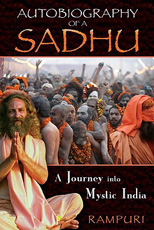"I learned to call these ascetics sadhus and sannyasis. Swathed in ochre cloth as a flag of their renunciation, they looked like the deities I saw in temples. People touched their feet and offered them sweets, flowers, and money. Yet I also sensed that they were marginal characters, proud of their distance from society, dropouts like me. They seemed to operate under a different set of rules. I sensed a kinship with them: The rules I had grown up with had lost their meaning, and my own goals varied from those of my society.
"The fact that they had some special knowledge brought out a hip arrogance in these sadhus. Their eyes twinkled, and I found their electricity magnetic. But there was a huge difference between us: They seemed to Know, and I didn't. They all shared some secret, and I wanted to know whatever it was they knew. I wanted in, but I didn't even have the categories in which to put these people who were more storybook than real.
"I learned that these sadhus and sannyasis lived in temples, caves, thatched huts, and in monastery-like retreats called ashrams. Sometimes they spent their lives wandering the jungles and mountains. They also practiced various spiritual techniques and disciplines called sadhana (hence sadhu) or Yoga. A sadhu who formalized his renunciation through a fabulous yet terrifying initiation ritual was called a sannyasi, or 'he who has given up everything.'
"The sadhus that I met all over India emulated and worshipped Shiva, the great ascetic god of the Hindus. I began to notice this god everywhere. In pictures, posters, and statues, Shiva is usually depicted as a long-haired, three-eyed, effeminate-looking man, ash-white in color, sitting in deep meditation on a tiger skin, two eyes rolled upward and the third one closed. He wears a cobra around his neck and the five-day-old crescent moon in his hair from which a torrent of water (the Ganges or Ganga) springs forth. In his hand he holds a trident, with a two-headed drum dangling from its spikes. The great bull, Nandi, waits on him and serves as his divine vehicle. This naked ascetic, the great god Shiva, roams the three worlds (Heaven, Earth, and Hell) in ecstatic bliss. He is the first baba.
"Because his meditative state of pure consciousness is considered to be the very foundation of the universe, the prerequisite for creation, Shiva is worshipped as a phallus. In his temples, this phallus, called a Shiva linga, usually takes the form of a large, naturally polished, egg-shaped stone, preferably coming from the Narmada River that flows east to west through central India.
"I became enchanted listening to stories of gods, yogis, shamans, and other sometimes-bizarre sages. I heard of sadhus performing great austerities, acquiring superhuman powers, called siddhis, attaining great wisdom and the highest levels of consciousness. Every devotee had stories of superhuman feats that his guru had accomplished. There was Shri Shri Shri Sivabalayogi, who had remained in perfect yogic absorption for twenty or thirty years, not eating or speaking, and barely breathing. He appeared in public once a year, during the rites of Shiva, when the doors of the temple in which he sat were pulled open. There was Baba Ji, about whom Yogananda wrote. He was hundreds of years old, could appear at several places at the same time, and transport himself in a flash anywhere he wanted to go. There were those who could fly, travel to other dimensions, sit naked all winter on a glacier, enter the bodies of others, heal the sick, and raise the dead. There were those who knew the Truth. I wanted to meet these extraordinary men and women, and to understand and experience just what the human possibilities in this Extraordinary World were.
"I wanted to know my own possibilities, who I was, and where I belonged. I had to find someone who knew, and who could and would tell me. I was desperate to know how I fit into the cosmic scheme of things. I was determined to find my very own Dharma, my correct path, as I continued to wander through India, looking for clues and ready for anything."
